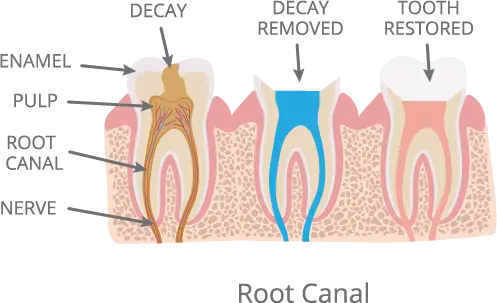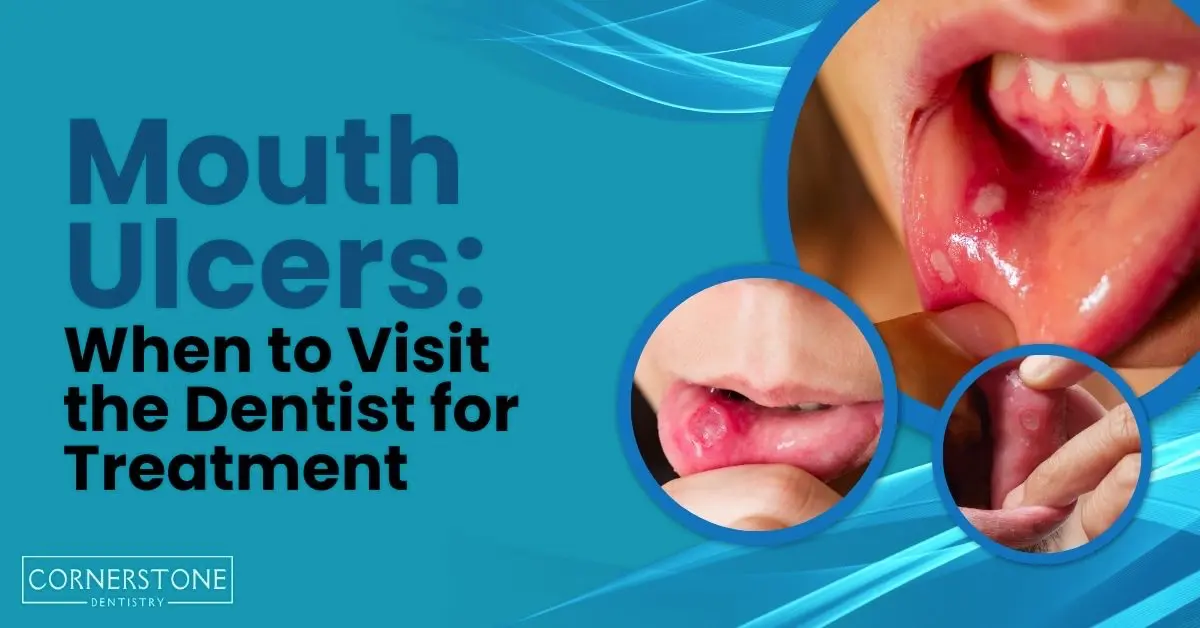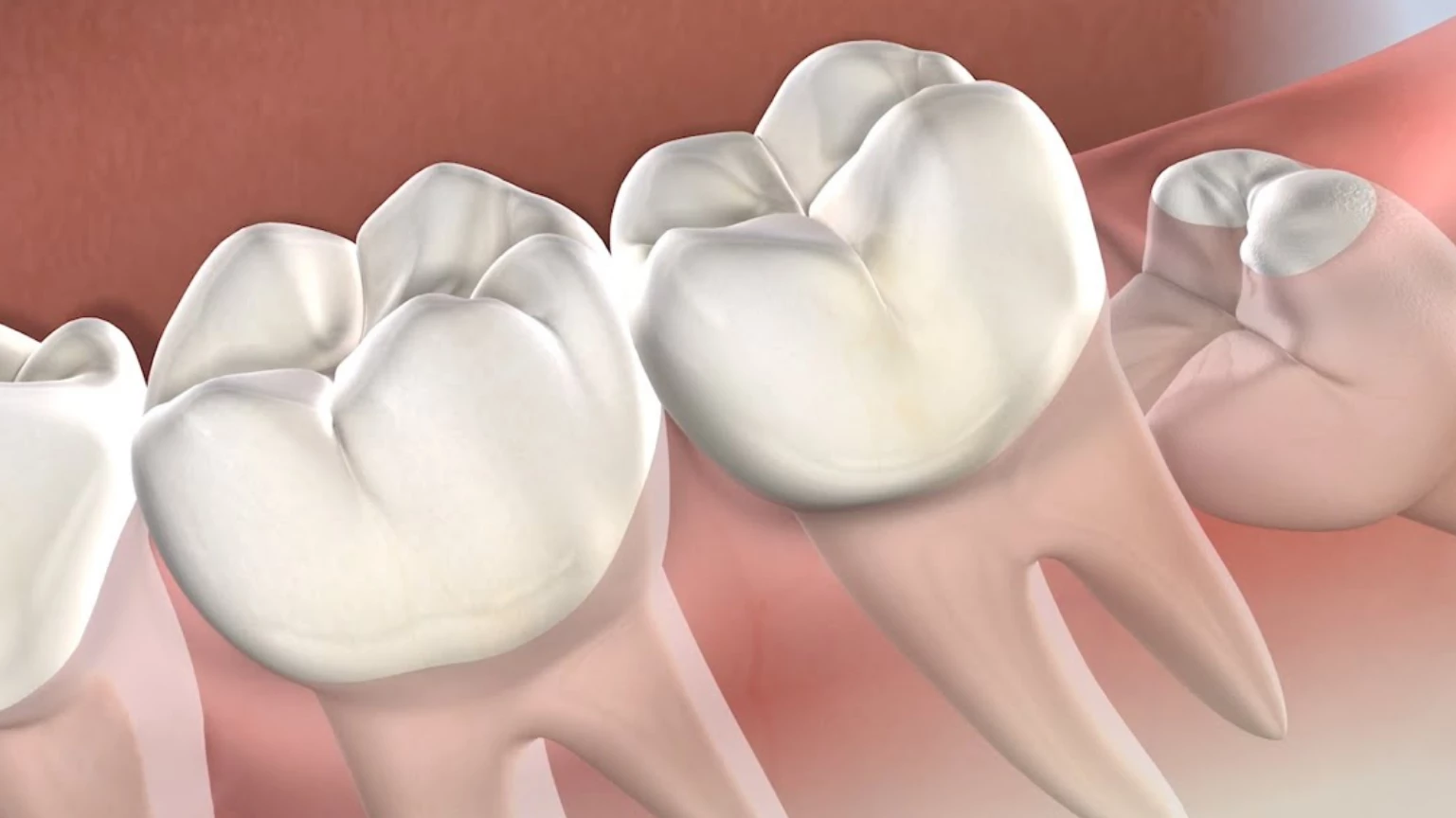Fast, Gentle Relief From Tooth Pain
A deep, throbbing ache often means bacteria have reached the inner nerve of the tooth. This is where the pain comes from, not the root canal itself. A root canal is a restorative procedure designed to stop infection, remove discomfort, and save your natural tooth so you don’t have to consider more complex or more expensive alternatives like extraction and implants.
Our approach prioritizes comfort, precision, and communication. With digital imaging, modern technology, and gentle anesthetic techniques, most patients describe the experience as similar to getting a filling. If you’ve been dealing with ongoing pain or sensitivity, you don’t need to wait. Our team is here to help you feel better quickly.
Do You Need a Root Canal? Here are the Signs!
A root canal becomes necessary when the pulp—the soft tissue containing nerves and blood vessels—becomes inflamed or infected. This can happen due to deep decay, trauma, or a crack that allows bacteria to enter the inner part of the tooth. While symptoms vary, most patients notice a combination of the following:
- Lingering sensitivity to hot or cold
- Pain when chewing or applying pressure
- Sudden throbbing or pulsing pain
- Tender or swollen gums around the tooth
- Darkening or discoloration of the tooth
- A pimple-like bump on the gum
- Pain that worsens at night or when lying down
Many Anderson patients wait longer than they should because the pain comes and goes. Even if symptoms improve temporarily, infection inside the tooth does not heal on its own. The longer it progresses, the higher the risk of losing the tooth completely.
At Cornerstone Dentistry, we use advanced digital imaging to get a clear picture of what’s happening beneath the surface. If a root canal is the most predictable, long-term solution, we’ll walk you through every step so you know exactly what to expect.



Our Approach to Comfortable Root Canal Treatment
Root canals today are not the painful procedures people remember from decades ago. Thanks to improved technology and gentler techniques, treatment is faster, smoother, and far more comfortable for patients.
Here’s what makes our approach different:
Modern Imaging for Accurate Diagnosis
Digital X-rays allow us to detect infection precisely and create a focused treatment plan tailored to your tooth’s anatomy.
Gentle Anesthetic Techniques
We take our time ensuring the area is completely numb before beginning treatment. Most patients feel pressure—not pain.
Rotary Endodontic Instruments
These advanced tools help clean and shape the canal efficiently, reducing chair time and improving treatment outcomes.
Rubber Dam Isolation
This protects the tooth from contamination during treatment and keeps the experience cleaner and more comfortable.
Clear Communication and Reassurance
Throughout the appointment, our team checks in with you, explains what’s happening, and makes sure you feel confident and relaxed.
Emergency Appointments Available
When tooth pain strikes suddenly, we do our best to offer same-day appointments so you get relief as soon as possible.
This combination of technology, precision, and compassionate care helps us make root canal therapy a far better experience than many expect.
What Happens During Your Root Canal Treatment
Understanding the procedure can ease anxiety, so here’s a simple, clear overview of what happens during a typical visit:
1. Confirming the Diagnosis
We examine the tooth, discuss your symptoms, and take digital X-rays to determine whether the pulp is inflamed or infected.
2. Numbing the Area
Once you’re completely numb, we isolate the tooth and begin treatment.
3. Removing the Infection
A small opening is made to access the pulp chamber. We gently remove the infected tissue and clean the canal thoroughly.
4. Shaping and Disinfecting
We shape the canal so it can be sealed properly, then disinfect the area to eliminate remaining bacteria.
5. Filling and Sealing the Canal
The cleaned canal is filled with a safe, durable material that prevents reinfection.
6. Temporary Restoration
We place a temporary filling to protect the tooth until your permanent crown appointment. Almost every root canal treated tooth requires a crown for long-term strength and stability.
Most root canal appointments take less than an hour, depending on the severity of the infection and the tooth’s structure.
What to Expect After Treatment
Recovery from a root canal is usually simple. Some tenderness is normal for a day or two, especially when chewing, but discomfort typically responds well to over-the-counter pain relievers.
Here’s what you can expect:
- Mild soreness or pressure
- Sensitivity when biting
- Quick return to normal activities, often the same or next day
Avoid chewing on the treated tooth until the final crown is placed. This helps prevent cracks or reinfection.
When to Call Us
While complications are rare, contact us if you notice:
- Increasing pain instead of improvement
- Swelling around the tooth or jaw
- A return of throbbing or pressure
We’re here for follow-up care and questions anytime.

Why Anderson Patients Choose Cornerstone Dentistry
Choosing a root canal specialist matters. The accuracy of the diagnosis, the comfort of the procedure, and the long-term success all depend on your dentist’s skill and technology. Here’s why patients throughout Anderson trust our team:
Comfort-Focused Dentistry
Gentle anesthesia, patient-first communication, and a calm, supportive environment help reduce anxiety.
Advanced Technology
Modern tools make treatment faster, more predictable, and more comfortable.
Experienced Team
Our doctors have extensive experience performing root canal therapy and restoring teeth with long-lasting results.
Long-Term Tooth Preservation
We aim to save your natural tooth whenever possible, avoiding extraction and costly replacements.
Clear Expectations and Honest Guidance
We explain every step, discuss your options, and help you choose the treatment that best fits your oral health needs.
Convenient Scheduling
With flexible appointment options and emergency availability, we help you get relief quickly.
Frequently Asked Questions
Do root canals hurt?
Not with today’s techniques. The procedure itself relieves pain and feels similar to getting a routine filling.
Is extraction cheaper?
Initially, extraction may cost less, but long-term replacement options like implants or bridges are more expensive and invasive. Preserving your natural tooth is usually the healthier choice.
How long does a root canal last?
With proper care and a well-fitted crown, many treated teeth last a lifetime.
Will I need antibiotics?
Not always. Antibiotics help with swelling but do not replace the need for root canal treatment when the nerve is infected.
How much does a root canal cost?
Root canal treatment at our office typically ranges from $850–$1,050, depending on the tooth and complexity. We provide a cost estimate before treatment and review your insurance options.
Schedule Your Appointment
If you’re dealing with tooth pain or think you may need a root canal, we’re here to help.
Call us at (864) 222-9001 or use our online scheduling link to request an appointment.
We offer same-day emergency visits whenever possible.
If you have any questions or would like to schedule an appointment with your Anderson dental team, give us a call at (864) 222-9001 or request an appointment online! We look forward to hearing from you!








